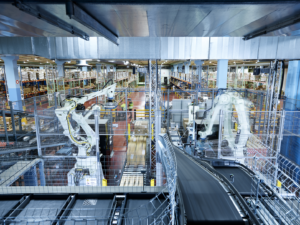The rapid progress in robotics and information technology is constantly pushing the boundaries of technology. Many new technologically-driven trends will have a tremendous influence on our lives and our futures. This includes trends in digitization, sustainable energy production, 3D printing, genetic engineering and self-propelled vehicles. In particular, robotics and artificial intelligence will shape our professional and private lives.
As Product Manager for robot systems, Markus Posch promotes strategic innovations in the areas robotics and machine learning. In the following interview, he illuminates on the opportunities and challenges that robotics and artificial intelligence hold for logistics in particular.

Robots assist us during surgery, in automotive production, they mow the lawn and transport goods from A to B. Why is it that robots are becoming increasingly present in our everyday life?
Markus Posch: Over recent years, the basic foundations have been laid for an increased use of robots in daily life and in the intralogistics environment. Thanks to the further technological development of sensor elements, image processing systems and software algorithms, these basic conditions have been met so that we now are able to implement robot solutions.
What’s more, there are large funding projects and numerous investors providing the financial resources needed to advance the use of robotics. In addition, global players such as Google, IBM and Amazon invest heavily in this type of technology. Many start-up companies also take innovative approaches to create new solutions.
Moreover, there are two key factors which have a major impact on logistics and robotics: the huge increase in online business on the one hand and the limited resources and increasing personnel costs on the other. In view of these factors, there is no doubt that now is the time to integrate more robots into logistics.

Robots take over where humans reach their physical limits. They are perfect for carrying out monotonous, repetitive and strenuous tasks. They achieve the same level of quality and performance over long periods of time. Process reliability, precision and reliability in general is what distinguishes the robots. They can work in environments that are unhealthy or too dangerous for humans. Industrial robots combined with artificial intelligence make logistics processes faster, more economical and more efficient.
Markus Posch, Product Manager Robot Systems, KNAPP AG
Aside from the technological trends and progress, we are also seeing other major developments such as urbanization and progress in digitization and globalization. Are these trends also influencing logistics?
Markus Posch: Definitely! Globalization and the possibilities that digitization has opened up have turned logistics into a highly complex field. It now covers the organization, control, supply and optimization of all processes along the supply chain involving the flow of goods, information, money and personnel. As a result, logistics has become an essential factor to financial success.
What the end customers expects from us is to deliver the right articles in the right quantity at the right time to the right location. These expectations, in turn, are also the challenges in logistics that we need to overcome. In future, robots and artificial intelligence will be integrated into the logistics processes on a large scale, which will change the logistics chain permanently, to keep our customers satisfied!
Can you give us an example of one such a robot solution?
Markus Posch: One example is our picking robot, the Pick-it-Easy Robot. As part of the picking process, the robot prepares the customer orders given to it, in other words, based on the customer order, the robot picks the individual articles in the right quantity from the article range. The incredibly diverse range of articles is the main challenge here for the automation technology and robotics.
How do you overcome this challenge?
Markus Posch: We rely on two solutions: a sophisticated gripper technology and highly advanced camera systems which use machine learning. Today’s technology is able to detect and grip any type of article. The use of computer vision and machine learning makes it possible to detect, segment and classify an article within a split second and to determine the optimum grip point. The robot learns with each gripping movement and thereby keeps developing; it becomes more intelligent over time and, as a result, optimizes the picking process. Furthermore, it is possible to train the neural networks using synthetic data and simulation programmes. From today’s perspective, machine learning is the only practical approach to solving complex tasks within logistics.
Pick-it-Easy Robot learns with each gripping movement and thereby keeps developing.
But it’s not just in logistics that machine learning is becoming increasingly present, we are also seeing it more and more in our everyday lives.
Markus Posch: Yes, that’s true and it has been a gradual process so users and consumers haven’t even noticed that they are now using AI-controlled applications every day. Two examples are intelligent loudspeakers with AI-controlled language assistants and wireless headsets that provide simultaneous interpreting. Applications which identify objects within images and then provide purchase recommendations based on the content of these images are also already encouraging consumers to place orders online. In this context, customers have the same expectations: they want their items to be delivered to the right location as quickly as possible in the right quality and quantity. Companies like KNAPP offer state-of-the-art technologies and services that meet these demands and that make logistics more efficient and customer-friendly, with the ultimate aim of keeping their end customers happy.
Thanks for talking with us!
Further reading recommendations

Machine learning is everywhere. But what exactly lies behind this future technology? Is it really possible to teach machines to learn? What advantages does it offer– and where does KNAPP come into play? Let’s take a closer look.

Thanks to its intelligent error handling and consistently high performance, the Pick-it-Easy Robot perfectly reflects KNAPP’s zero defect philosophy.

The world of logistics is changing. Automation and robotics are on the rise and already feature in countless distribution and production centres around the world.
